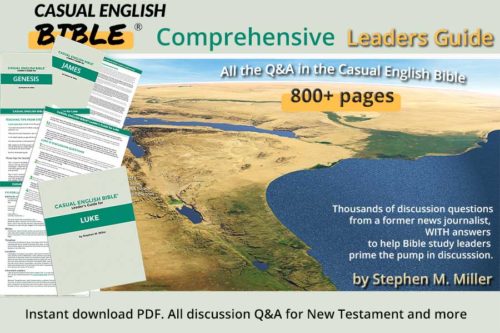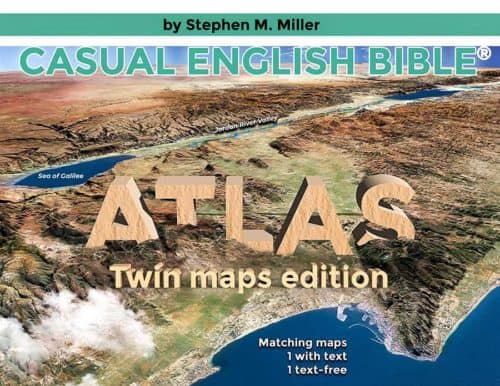Judges 2
Israel falls for other gods
Bad news from God
1The LORD sent a messenger [1] from Gilgal [2] to the people of Israel at Bochim. The messenger said, “I brought you here all the way from Egypt. You’re here because I promised this land to your ancestors. I told them, ‘I’ll never break my part of the agreement I made with you. 2But when it comes to your part of the agreement, you aren’t allowed to make peace treaties with the people living here. And you have to tear down the altars they made to worship their gods.’ You didn’t keep your word. Look at what you’ve done.3So, I’m not going to drive these other nations away for you. I’m going to let them stay. They’re going to become your enemies. You’re going to end up worshiping their gods. And it’s going to get you in trouble.” 4When the messenger finished talking, the people started sobbing. 5So, they named the place Bochim. [3] And they offered the LORD sacrifices.
When Joshua dies, people go bad
6When Joshua told the Israelites they could go on their way, everyone went to take control of the parcels of lands allotted to them. 7The Israelites worshiped the LORD for as long as Joshua lived. And they did it, too, for as long as that generation of elders lived. Those were the people who had seen for themselves what the LORD did to help Israel.8Joshua, Nun’s son, died at the age of 110 years. 9The people buried him on his property in Timnath-heres, in the hills of Ephraim’s tribe, north of Mount Gaash. 10That entire generation eventually died. The next generation hadn’t seen for themselves what the LORD did for Israel. They didn’t know him.
When it all goes wrong
11These Israelites did something terribly wrong. They worshiped the local god, Baal, [4] 12They gave up on the LORD of their ancestors —the God who led them out of slavery in Egypt. Instead, they worshiped gods of the local people who lived among them. This upset the LORD. 13The Israelites had let go of the LORD and latched on to Baal and Ashtaroth. [5]14Infuriated at Israel, the LORD let their enemies come at them from all sides. Raiders started pushing them around and stealing their stuff. Israelites couldn’t stop them. 15Every time Israel mounted a campaign to fight back, they got themselves beat up. The LORD saw to it, as he promised. Israelites didn’t know what to do. 16The LORD produced heroic tribal leaders [6] who were able to stop the raiders and others who had been stealing from Israel and hurting the people. 17But that didn’t change the people. Safe again, they started ignoring their own leaders. They quickly turned their back on traditions of the ancestors who had worshiped the LORD. Instead, they worshiped other gods. Bad choice.
God sticks with the heroic leaders
18Whenever the LORD produced heroic leaders who saved them, the LORD stuck with those leaders for the rest of their lives. He did this in response to the people’s desperate prayers. God felt compassion for the beat-up Israelites.19But when the leaders died, the people flipped back to their old habit of worshiping other gods. Newer generations sinned worse than the sinful generations before them. These people just couldn’t quit worshiping those gods. 20So the LORD would say, “These people have broken the contract I made with their ancestors. The contract clearly says what they need to do to honor the agreement. But they didn’t do it.
Others in Israel are there to stay
21So, I’m not going to drive away any of the nations that were still here when Joshua died. If they’re here now, they’re staying.” 22These nations became a test of Israel’s devotion to the LORD, or lack of it. Would the Israelites follow the tradition of their ancestors and worship the LORD? That’s the question on the test. 23And that test is the reason the LORD let those nations stay in Israel’s land.Footnotes
Some Bible versions call the emissary an “angel.” But the Hebrew word mal’ak means “messenger” or “representative,” or “envoy.” The messenger could be human or celestial. If this messenger was an angel from heaven, the obvious questions are what was the angel doing in Gilgal and why didn’t he give the message to those folks? Perhaps this messenger was an angel from heaven. Or maybe just a human in Gilgal whom God called on to deliver the message. God later called on Amos, a fig farmer from Tekoa, to deliver his message to the king of Israel, who was about to lose his country (Amos 1).
The locations of Gilgal and Bochim are both uncertain. Gilgal, however, was somewhere near the oasis town of Jericho, a few miles west of the Jordan River. Contenders for Gilgal include several dirt-covered mounds of ruins near Jericho. No winners yet. Gilgal is where the Israelites first camped after they crossed the Jordan River. It became the staging ground for their siege of Jericho. Some scholars say Bochim was another name for Bethel (Beitin), in the central hills of Canaan, roughly 10 miles (16 km) north of Jerusalem
Bochim is a Hebrew word for crying or weeping.
The Hebrew word is plural, baalim. Some scholars say this refers to different forms of the main Canaanite god, Baal. He was a god of weather and fertility in family, flocks, and fields. People worshiped him using different styles of idols and by calling him various names: Hadad, Cloud Rider, Baal of [fill in whatever the local region was, such as Baal-zephon or Baal of Peor]. Peor was a mountain in Moab where people worshiped Baal. Baal of Peor was apparently a local representation of him. When women from Moab seduced some of the Israelite men to engage in either ritual sex or just plain ol’ illicit sex, it led the men into idolatry (Numbers 25). Some scholars say one worship ritual involved entertaining Baal by letting him watch people have sex. They did this so he would make it rain. It’s a tad gross, but some taught that the rain was Baal’s semen. So, if the sex of worshipers got Baal stimulated enough, he would make it rain in this predominately dry part of the world.
Also known as Ashtarte, the Greek form of her name. Like Baal, she was a god of fertility. But she was also a go-to god for matters of love and war. Sometimes she’s described as Baal’s wife. Her figurines portray her as well-endowed, and then some—with her privates exposed and prominently displayed. She’s not the same god as Asherah (3:7), who shows up more often in Canaanite archaeological discoveries. Ashtaroth turns up in what are now Iraq and Iran—the land between the rivers, known as Mesopotamia. There, she was usually known as Ishtar.
Leaders in this Bible book are often called “judges,” but that might not be the best word to describe them. Yet the Bible book is named after that term. Most of these leaders, which some Bibles call “special leaders” or “chieftains,” were not judges who tried legal disputes and court cases. Deborah was an exception who did do that (Judges 4:5). The Bible paints these people as standout heroic figures in ancient Jewish history, though some of their stories end sadly: Samson, Gideon, Jephthah. Several of these heroic leaders were warriors: Othniel, Ehud, Barak, Gideon, and Jephthah. For others, we know little more than their names: Tola, Jair, Ibzan, Elon, and Abdon. Samson was outstanding among the standouts. But not so much in a good way. It seems that everything he said and did, including what he said in his dying prayer, was for selfish reasons.
Discussion Questions
- Sorry, there are currently no questions for this chapter.










